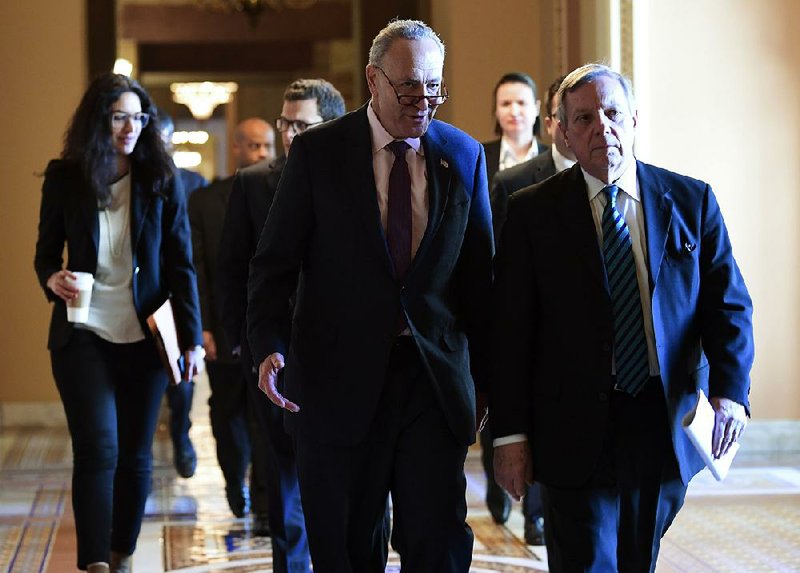Senate Republicans narrowly approved the most sweeping rewrite of the U.S. tax code in three decades, a bill that slashes the corporate tax rate and provides temporary tax-rate cuts for most Americans.
The 51-49 vote -- achieved just before 2 a.m. Saturday in Washington and only after private deal-making with reluctant senators -- takes Republicans close to delivering a policy win for their party and President Donald Trump.
After the vote, Trump said on Twitter that he looks forward to signing a final bill before Christmas. Vice President Mike Pence tweeted that a pre-Christmas tax cut would be a "Middle-Class Miracle!"
Congressional Republicans expressed confidence that final legislation would be sent to Trump by the end of the month.
[PRESIDENT TRUMP: Timeline, appointments, executive orders + guide to actions in first 200 days]
Before it goes to Trump, lawmakers will have to resolve differences between the Senate bill and one the House passed last month, a process that could begin Monday.
During a news conference after the Senate vote, the majority leader, Sen. Mitch McConnell, R-Ky., said there was little doubt that a consensus plan would soon become law after a conference committee resolved the differences between the two bills. "This is a great day for the country," McConnell said.
Although both versions share common top-line elements, negotiations on individual provisions inserted to win votes, particularly in the Senate, may be protracted and difficult. The final product will end up being a central issue in the 2018 elections that will determine control of Congress.
"We're going to take this message to the American people a year from now," McConnell said.
Speaking in New York on Saturday, Trump also predicted the tax package would be a winner for Republicans in the 2018 midterm elections. "We got no Democrat help and I think that's going to hurt them in the election," Trump said at a fundraising event.
Both the House and Senate measures would cut the corporate tax rate to 20 percent from 35 percent -- though the Senate version would set that lower rate in 2019, a year later than the House bill would. Also, the Senate bill, unlike the House version, would provide only temporary tax relief to individuals, ending tax cuts for them in 2026. Both bills are expected to add more than $1.4 trillion to the federal deficit over 10 years, before accounting for any economic growth.
Sen. Bob Corker of Tennessee, who had cited concerns over the bill's effects on federal deficits, was the only Republican dissenter. McConnell rejected revenue scores that suggested the bill's tax cuts would add to the deficit. He predicted it would be a "revenue producer" by stimulating economic growth.
"I not only don't think it will increase the deficit, I think it will be beyond revenue neutral," he told reporters. "In other words, I think it will produce more than enough to fill that gap."
The House and Senate bills also align on the contentious issue of individual deductions for state and local taxes: They'd eliminate all but a deduction for property taxes, which would be capped at $10,000.
But they differ on the home mortgage-interest deduction; the House bill would restrict that break to loans of $500,000 or less with regard to new purchases of homes. The Senate legislation would leave the current $1 million cap in place.
They also differ -- narrowly -- on the tax rates they'd apply to multinational companies' accumulated offshore earnings. The House bill would tax those profits at 14 percent for earnings held as cash and 7 percent for less-liquid assets. The revised Senate bill contains a lengthy section that has no direct mention of the rates, but a person familiar with the Senate plan said they'd be 14.5 percent for cash and 7.5 percent for less-liquid assets.
SIMPLE MAJORITY
Senate Republican leaders muscled the legislation through the chamber less than two weeks after releasing the bill draft. Many GOP lawmakers, including Corker and Lindsey Graham of South Carolina, have expressed concerns that the party has little to show so far before next year's congressional elections, after the collapse of a repeal of the Patient Protection and Affordable Care Act earlier this year and no action on issues ranging from immigration to infrastructure.
Trump expressed gratitude to McConnell and Finance Committee Chairman Orrin Hatch for steering the measure through the Senate.
"We are one step closer to delivering MASSIVE tax cuts for working families across America," Trump wrote on Twitter.
Republicans were able to get the legislation to a vote using Senate rules that allowed them to approve it with a simple majority, therefore without any Democratic support. The GOP controls 52 votes in the chamber, eight shy of what's typically needed to move controversial measures that draw delaying tactics by opponents.
That narrow majority made it important for Senate leaders to try to hold every member's vote; moderate Sen. Susan Collins of Maine used that leverage to secure various concessions, including an agreement to enhance an individual deduction for large nonreimbursed medical expenses through the end of next year. The House bill would eliminate that tax break.
Democrats decried the bill's deficit impact and complained they were shut out of the process to help draft the measure. They cited research showing that the legislation primarily benefits the nation's highest earners and business owners, and will bleed federal revenue in a way that hurts domestic programs.
"At a time of immense inequality, the Republican tax bill makes life easier on the well-off and eventually makes life more difficult on working Americans, exacerbating one of the most pressing problems we face as a nation -- the yawning gap between the rich and everyone else," said Minority Leader Charles Schumer of New York during debate on the bill.
Schumer noted that a set of last-minute revisions to the bill changed it in ways that had yet to be analyzed by the Joint Committee on Taxation, Congress' official scorekeeper for the effects of tax legislation. "Is this really how Republicans are going to rewrite the tax code? Scrawled like something on the back of a napkin?"
McConnell said the bill, the first text of which was introduced on Nov. 20, went "through the regular order." He dismissed complaints like Schumer's. "You complain about process when you're losing," McConnell said.
Many Democrats also zeroed in on the manual edits as evidence that Republicans were carelessly pushing the bill through the Senate without thorough consideration.
Sen. Robert Casey Jr., D-Pa., tweeted at the Senate GOP, "How about we take a break until you can type at least this thing up? Maybe read it and get some nonpartisan analysis?"
"This is how we're writing legislation now?" Sen. Mark Warner of Virginia asked on Twitter.
Rep. Don Beyer of Virginia replied sardonically: "Don't worry MarkWarner -- it's just a rewrite of the entire US tax code being scribbled down on pieces of paper. What could go wrong?"
'QUICKLY' TO COMMITTEE
Attention now shifts to a House-Senate conference committee -- a specially appointed, temporary panel assigned the task of hashing out the differences in the bills and preparing a final version for both chambers to consider. Party leaders will select a small group of lawmakers, likely from the House and Senate tax-writing panels in each chamber, who would then be approved by each chamber.
That work could start as early as Monday, with many high-stakes issues to be worked through. The deadline of Dec. 31 is an artificial one, though -- aimed partly at securing a victory well in advance of the 2018 congressional elections. Republicans would have until the end of 2018 before they lose their ability to clear final passage in the Senate without a filibuster.
Speaker Paul Ryan of Wisconsin said early Saturday that the House would move "quickly" to a conference committee.
"Now it's time to take the best of both the House and Senate bills, make them even stronger in a conference committee," Rep. Kevin Brady, R-Texas, the chairman of the Ways and Means Committee, said in a news release Saturday, "and finalize one piece of legislation that will dramatically improve the lives of Americans for generations to come."
After the Senate vote, some Republicans seemed to hint that a conference might not even be necessary. "We'll see," said Hatch, when asked if he thought the House might just take up the Senate's bill.
Both bills share some key central elements: They both almost double the standard deduction for individual taxpayers while eliminating personal exemptions. They both allow companies to fully and immediately deduct the cost of their spending on equipment for five years. But the Senate version would slowly step down the expensing provision after the five-year period -- a feature that the House bill doesn't provide for.
Yet there are many differences -- ranging from the taxation of business income to the amount set for the child tax credit -- and Senate negotiators may have the upper hand during talks. That's because the wafer-thin two-vote majority in the Senate will make it harder to usher a final bill back through that chamber.
The House bill would consolidate the current seven individual tax brackets to four, leaving the top tax rate at 39.6 percent. The Senate bill would have seven brackets -- with lower rates, and a top rate of 38.5 percent. Studies have shown that many of the tax bill's benefits would go to the highest earners -- and some middle-class taxpayers might actually pay more -- a finding that could affect the House-Senate talks.
The Senate bill includes a repeal of the Patient Protection and Affordable Care Act's mandate that most Americans have health insurance or pay a penalty. The House bill does not.
Senators approved a 23 percent tax deduction -- subject to certain limitations -- on business income earned from partnerships, limited liabilities and other so-called pass-through businesses. The House version would create a 25 percent tax rate for such business income -- with restrictions on which businesses could qualify. Small businesses would get extra relief under the House legislation as well.
The House bill also would eliminate the estate tax, while the Senate version would limit the tax to fewer multimillion-dollar estates, but leave it in place. And after 2025, the limits would lift.
Under current law, the estate tax applies a 40 percent levy to estates worth more than $5.49 million for individuals and $10.98 million for married couples. The Senate bill would temporarily double the exemption thresholds. The House bill would double the exemption thresholds, and then repeal the tax entirely in 2025.
Information for this article was contributed by Laura Litvan, Sahil Kapur, Allyson Versprille, Laura Davison, Steven T. Dennis, and Jennifer Jacobs of Bloomberg News; by Amy B. Wang of The Washington Post; by Bruce Schreiner of The Associated Press; and by Jim Tankersley and Alan Rappeport of The New York Times.
A Section on 12/03/2017

